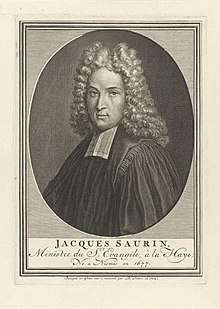Jacques Saurin
Jacques Saurin (January 6, 1677 – December 30, 1730) was a major French religious figure in the late 17th century and early 18th century who was particularly well-known as a preacher.[1] While he began his career as a Catholic priest, Saurin ultimately converted and became a pastor of the Reformed Church of France.[1]
Jacques Saurin | |
|---|---|
 | |
| Born | January 6, 1677 Nîmes, France |
| Died | December 30, 1730 (aged 53) |
| Nationality | French |
| Occupation | Preacher |
Early life and education
Jacques Saurin was born in Nîmes, France on January 6, 1677. He was the oldest child of Jean Saurin (1632-1705), a lawyer and the secretary of the Academy of Nîmes, and Hippolyte de Tournière.[2] Jacques Saurin had three younger siblings: Louis, Marc-Antoine, and Anne-Marie.[2] Saurin and his siblings were raised as huguenots.[3]
In 1685, when the Edict of Nantes was revoked by Louis XIV, Saurin and his family were forced to flee from France.[3] The family ultimately settled in Geneva, Switzerland.[3] There, Saurin studied theology and philosophy.[4]
Saurin's studies were briefly interrupted in 1694, when he decided to volunteer to serve in the army of Victor Amadeaus II of Sardinia during the Nine Years' War against Louis XIV.[2] He remained in the army until the Treaty of Ryswick was signed in 1697.[2] He then returned to his studies in Geneva where he was taught by Louis Tronchin, Bénédict Pictet, and Jean-Alphonse Turretin.[2] He completed his studies on July 5, 1700.[2]
Career
While Saurin lived in Geneva, he embraced Catholicism and decided to become a Catholic priest after completing his studies.[1] Specifically, he found success preaching in Montpellier.[1]
In 1700, Saurin moved briefly to Holland before settling in London, England.[4] There, in 1701 he was appointed to serve as a pastor for a Walloon church.[4] He also served as a chaplain for a regiment of soldiers stationed in England.[1]
London's weather unfortunately did not agree with Saurin's health, and after only four years, he decided to leave England.[5] In 1705, he settled in The Hague.[4] Here, he underwent a religious conversion experience and became a pastor of the Reformed Church of France.[1]
Personal life
In 1703, Saurin married Catherine Boitoult.[2] Together, they had five children between 1707 and 1724: Philippe, Antoine, Jeanne-Isabelle, Jacques-Antoine et Guillaume- Sicco.[2]
Major works
- Sermons sur divers textes de l'Écriture Sainte, The Hague,1708-1725[5]
- Discours historiques, critiques, théologiques et moraux sur les événements les plus mémorables du Vieux et du Nouveau Testament, Amsterdam, 1720-1728[4]
- Abrégé de la théologie et de la morale chrétiennes, en forme de catéchisme, Amsterdam, 1722[4]
- État du christianisme en France, The Hague, 1725[4]
- Nouveau Sermons sur la Passion, Rotterdam, 1732[5]
References
- 1677-1730., Saurin, Jacques (2014-02-25). "Jacques Saurin sermons, 1792". findingaids.library.emory.edu. Retrieved 2018-11-08.CS1 maint: numeric names: authors list (link)
- Randl, Oliver. "Prédicateurs de langue française: Jacques Saurin – Une petite biographie". dvarim.fr. Retrieved 2018-11-08.
- Brewer, David Josiah (1910). Crowned Masterpieces of Eloquence, Representing the Advance of Civilization: as Collected in the World's Best Orations From the Earliest Period to the Present Time. London: International University Society. pp. 141–146.
- "Jacques Saurin (1677-1730) - Musée virtuel du Protestantisme". Musée virtuel du Protestantisme. Retrieved 2018-11-08.
- Chambers's Encyclopædia: A Dictionary of Universal Knowledge for the People, Volume 8. Edinburgh: W. and R. Chambers. 1876. p. 498.
External links
- Jacques Saurin sermons, 1792 at Pitts Theology Library, Candler School of Theology, Emory University